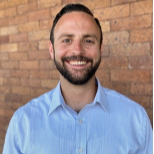Scott C. Thompson is a new Assistant Instructional Professor in the University Writing Program. He received his Ph.D. in English from Temple University in 2022, his M.A. in English from University of Colorado Denver, and his B.A. in English from the Hood College. He is thrilled to join the UWP this fall.
Thompson is hoping to continue to develop his expertise in teaching health and medical writing in as many ways as possible for the undergraduates in the UWP. For him, this starts with teaching new courses in Fall 24, including a brand-new course titled “Medicine and Storytelling,” which will consider the ways story and narrative intersect with health and health care.
In all his courses, Thompson’s overarching goal is to create empowered conversation partners. His pedagogy reflects his position that to be an effective interlocutor requires working knowledge of a shared discourse, active participation, respect for alternative perspectives, and confidence to express one’s own views. He strives to instill these skills and values in his students, and his hope is that they have the knowledge, ability, and confidence to participate in the discourses they learn about and develop in class, both within academic settings and beyond. He uses this notion of conversation as a simple and effective organizing framework for the core pedagogical principles around which he designs all his classes. He strives to include the students in the discourses of writing and teaching so that they are able to continue to develop their writing processes throughout their professional and personal paths; foster dialogue and respectful dissent in the classroom discussions; and frame academic writing and rhetorical strategies as transferable skills for use in both professional and personal contexts.
Thompson is currently working on a variety of projects while teaching courses in the UWP. His first project is a book chapter on the role public-facing writing can play in the current graduate school student’s career. It is titled “New Audiences and Applications: A Place for Public Writing in Graduate School” and is part of the edited collection Getting to the Finish Line: New Directions for the Dissertation Process. The collection is in the final stages of publication with MLA. He argues that in the current moment of resurging science skepticism and anti-intellectualism, popular science writing is undergoing a reevaluation of the discursive strategies it employs to mediate between professional scientists and the general public. His second project is a book chapter on the ways he incorporates humanities-based modes of inquiry to teach science writing. It is titled “Embracing Subjectivity: Humanizing and Historicizing Science Writing in the Post-Pandemic Classroom” and is part of the edited collection Teaching Science Writing. The collection is currently under review with MLA. His contribution makes a case for public writing in graduate school. Thompson argues that public writing affords graduate students a wealth of opportunities for forging new intellectual communities, building new audiences, and applying their skillsets to a range of professional and personal interests. His contribution draws on his first-hand experiences as a public writer and a graduate student, focusing on the ways his graduate research informed his public writing and the ways his public writing informed his graduate research. The third project Thompson is working on is a detective novel titled The Elephant Graveyard. An old adage in fiction writing is to “write the novel you want to read.” The Elephant Graveyard is his attempt to write the novel he wants to read, one that includes murder, mystery, and mansions with secret passageways.
The University Writing Program is honored to welcome Scott C. Thompson. We look forward to the great opportunities and collaborative energy he brings. Currently he services as the associate editor for the Journal of Writing and Artificial Intelligence alongside is work as an Assistant Instructional Professor for the UWP.
